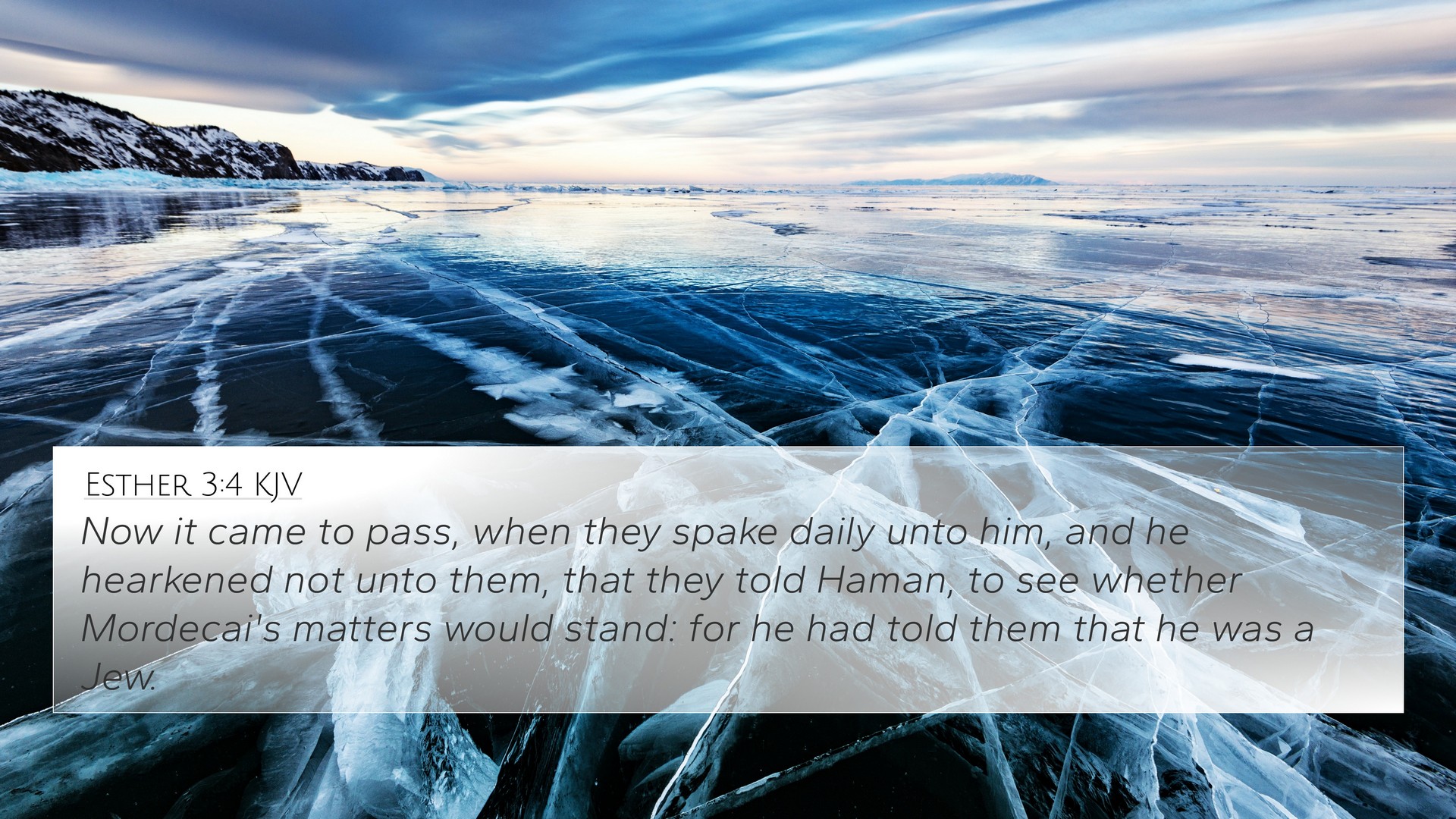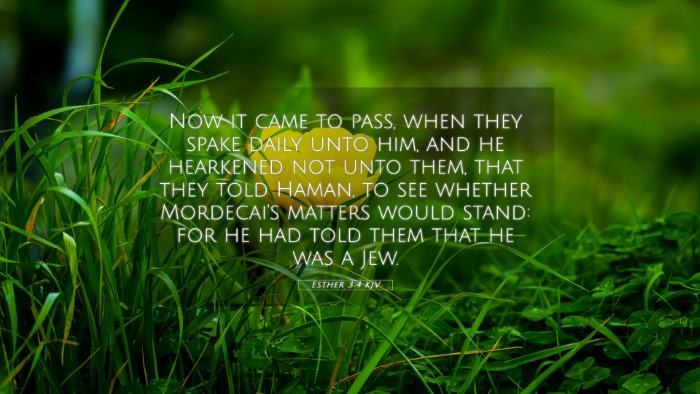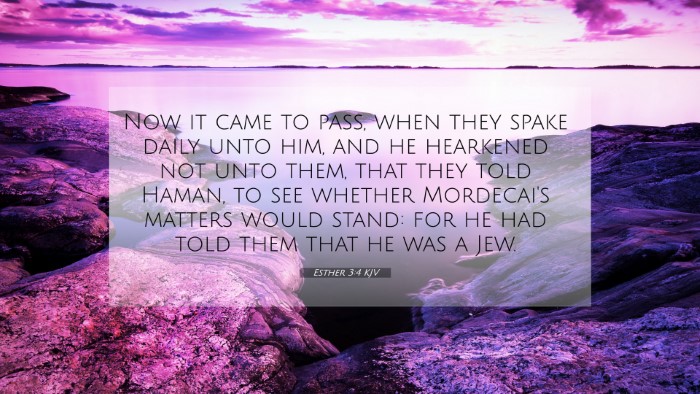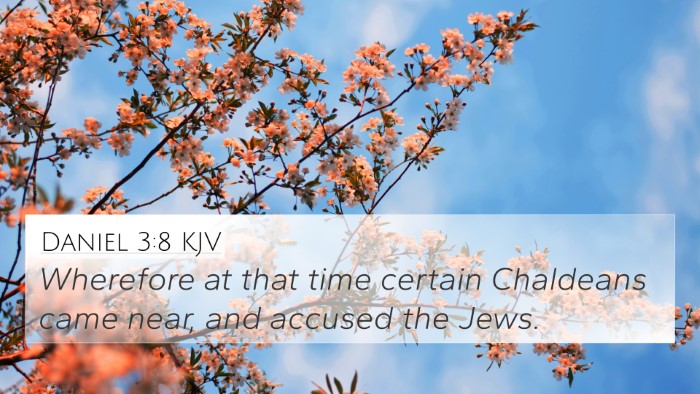Old Testament
Genesis Exodus Leviticus Numbers Deuteronomy Joshua Judges Ruth 1 Samuel 2 Samuel 1 Kings 2 Kings 1 Chronicles 2 Chronicles Ezra Nehemiah Esther Job Psalms Proverbs Ecclesiastes Song of Solomon Isaiah Jeremiah Lamentations Ezekiel Daniel Hosea Joel Amos Obadiah Jonah Micah Nahum Habakkuk Zephaniah Haggai Zechariah MalachiEsther 3:4 Similar Verses
Esther 3:4 Cross References
Now it came to pass, when they spake daily unto him, and he hearkened not unto them, that they told Haman, to see whether Mordecai's matters would stand: for he had told them that he was a Jew.
Uncover the Rich Themes and Topics of This Bible Verse
Listed below are the Bible themes associated with Esther 3:4. We invite you to explore each theme to gain deeper insights into the Scriptures.
Esther 3:4 Cross Reference Verses
This section features a detailed cross-reference designed to enrich your understanding of the Scriptures. Below, you will find carefully selected verses that echo the themes and teachings related to Esther 3:4 KJV. Click on any image to explore detailed analyses of related Bible verses and uncover deeper theological insights.
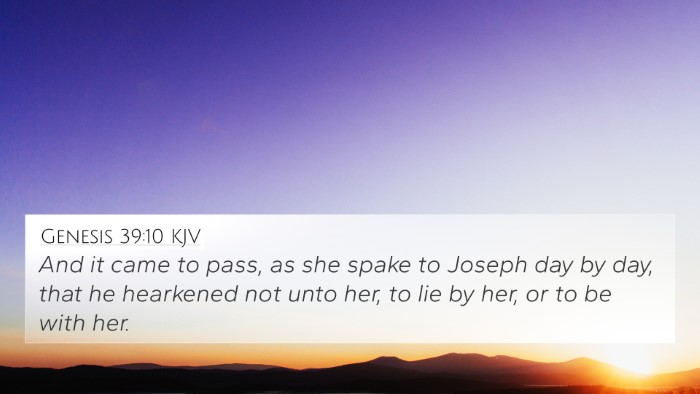
Genesis 39:10 (KJV) »
And it came to pass, as she spake to Joseph day by day, that he hearkened not unto her, to lie by her, or to be with her.
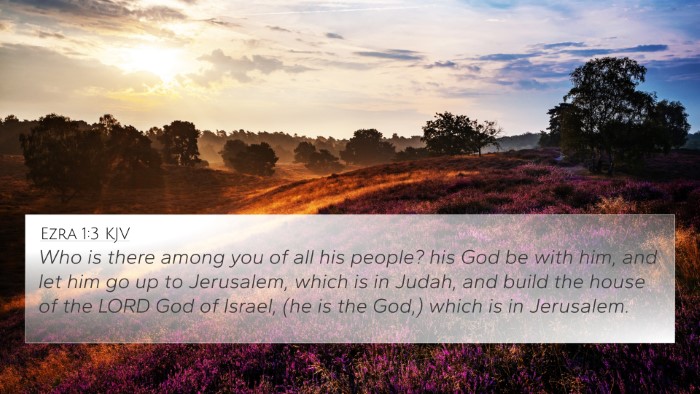
Ezra 1:3 (KJV) »
Who is there among you of all his people? his God be with him, and let him go up to Jerusalem, which is in Judah, and build the house of the LORD God of Israel, (he is the God,) which is in Jerusalem.
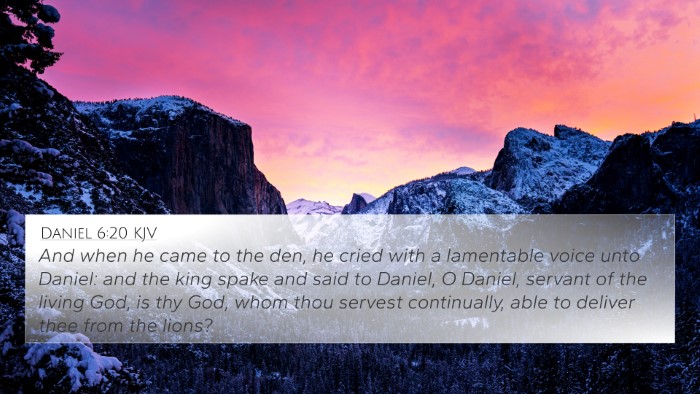
Daniel 6:20 (KJV) »
And when he came to the den, he cried with a lamentable voice unto Daniel: and the king spake and said to Daniel, O Daniel, servant of the living God, is thy God, whom thou servest continually, able to deliver thee from the lions?
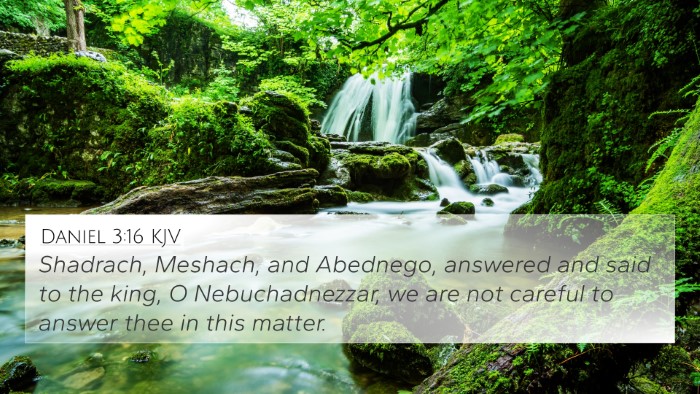
Daniel 3:16 (KJV) »
Shadrach, Meshach, and Abednego, answered and said to the king, O Nebuchadnezzar, we are not careful to answer thee in this matter.
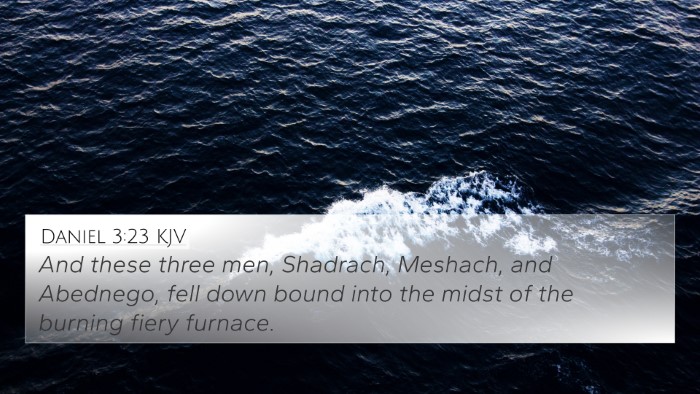
Daniel 3:23 (KJV) »
And these three men, Shadrach, Meshach, and Abednego, fell down bound into the midst of the burning fiery furnace.

Daniel 3:12 (KJV) »
There are certain Jews whom thou hast set over the affairs of the province of Babylon, Shadrach, Meshach, and Abednego; these men, O king, have not regarded thee: they serve not thy gods, nor worship the golden image which thou hast set up.
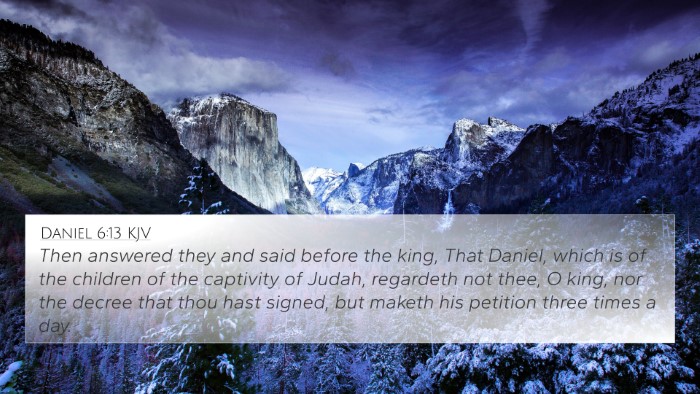
Daniel 6:13 (KJV) »
Then answered they and said before the king, That Daniel, which is of the children of the captivity of Judah, regardeth not thee, O king, nor the decree that thou hast signed, but maketh his petition three times a day.
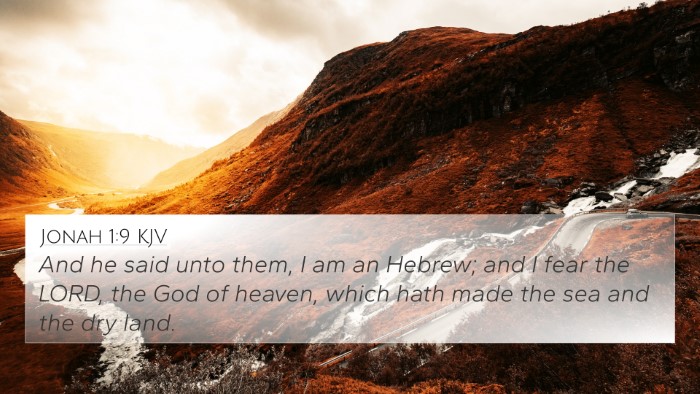
Jonah 1:9 (KJV) »
And he said unto them, I am an Hebrew; and I fear the LORD, the God of heaven, which hath made the sea and the dry land.
Esther 3:4 Verse Analysis and Similar Verses
Esther 3:4 - Summary and Biblical Context
Bible Verse: Esther 3:4 - "And when they had spoken daily unto him, and he hearkened not unto them, then they told Haman, to see whether Mordecai's matters would stand: for he had told them that he was a Jew."
Overview of Esther 3:4
This verse occurs in the context of Mordecai’s refusal to bow to Haman, which leads to escalating tensions between the two characters. The narrative of Esther serves as a pivotal moment in Jewish history during their exile in Persia. Haman's rise to power and his desire for respect is contrasted with Mordecai's steadfastness to his beliefs.
Insights from Public Domain Commentaries
-
Matthew Henry's Commentary:
Henry emphasizes the moral choices made by Mordecai, interpreting his refusal to bow to Haman as a testament to his faithfulness to God and his heritage as a Jew. This act of noncompliance highlights a significant principle in the believer's life: the prioritization of one’s faith over societal pressures.
-
Albert Barnes' Notes:
Barnes stresses the implications of this refusal, noting that it leads to catastrophic consequences not only for Mordecai but for the entire Jewish population. His analysis highlights the broader themes of persecution and resilience within the Jewish community.
-
Adam Clarke's Commentary:
Clarke provides insights into the historical context of the Persian Empire and the significance of Haman's authority. He notes that the episode reflects the perennial conflict between the oppressed and oppressor, a recurring theme in biblical narratives.
Thematic Connections and Cross-References
Esther 3:4 builds a bridge to several significant biblical themes and texts. The following are key cross-references that are thematically linked:
- Exodus 20:3-5: The commandment against idolatry and bowing to false gods resonates with Mordecai’s refusal to pay Haman the respect he demands.
- Daniel 3:16-18: The courage displayed by Shadrach, Meshach, and Abednego in standing firm against King Nebuchadnezzar’s decree parallels Mordecai's stand.
- Psalm 37:28: This verse speaks to God’s commitment to justice, reminding readers that the righteous will ultimately be vindicated.
- Philippians 3:20: The notion of citizenship in heaven encourages believers to remain steadfast despite worldly pressures, similar to Mordecai's stance.
- Matthew 10:28: Jesus’ admonition to "fear not them which kill the body" reflects the spirit of Mordecai’s resistance.
- Romans 12:2: Paul’s instruction to "not be conformed to this world" strongly resonates with the theme of cultural resistance shown by Mordecai.
- Hebrews 11:6: The faith of those who trust in God, regardless of circumstances, is exemplified in Mordecai's actions.
- Ephesians 6:13: The exhortation to “put on the whole armor of God” is a call to stand firm, akin to Mordecai's position against Haman.
- Revelation 2:10: The encouragement to be faithful unto death as a precursor to receiving the crown of life similarly frames Mordecai’s integrity.
- 1 Peter 5:10: The promise of restoration after suffering serves as a hopeful parallel to the fate awaiting the Jews in the Esther narrative.
Understanding the Cultural Context
During the Persian Empire, refusing to bow to a royal official was a serious act of defiance, potentially punishable by death. This cultural backdrop provides a deeper understanding of the stakes involved in Mordecai’s choices, illustrating the courage required to maintain one’s beliefs in a hostile environment.
The Importance of Cross-Referencing in Scripture Study
Engaging in comparative Bible verse analysis allows readers to uncover deeper meanings and connections. By utilizing a bible cross-reference system, individuals can enhance their study and gain a more comprehensive understanding of biblical themes and narratives.
Tools for Bible Cross-Referencing
- Use a Bible concordance to find related verses quickly.
- Employ cross-reference Bible studies to explore themes in depth.
- Leverage comprehensive Bible cross-reference materials to expand your biblical knowledge.
Applying Esther 3:4 Today
In a modern context, Esther 3:4 calls for believers to stand firm in their faith when faced with moral dilemmas. The assertion of one's beliefs in the face of adversity is a message that resonates deeply in both historical and contemporary settings. This theme of resilience and divine justice encourages individuals to reflect on their values and sources of strength.
Conclusion
Esther 3:4 serves as a powerful reminder of the challenges faced by those who adhere to their faith amidst pressure to conform. By exploring this verse through the lens of various public domain commentaries, readers can grasp its significance and draw relevant lessons applicable to their lives today.
